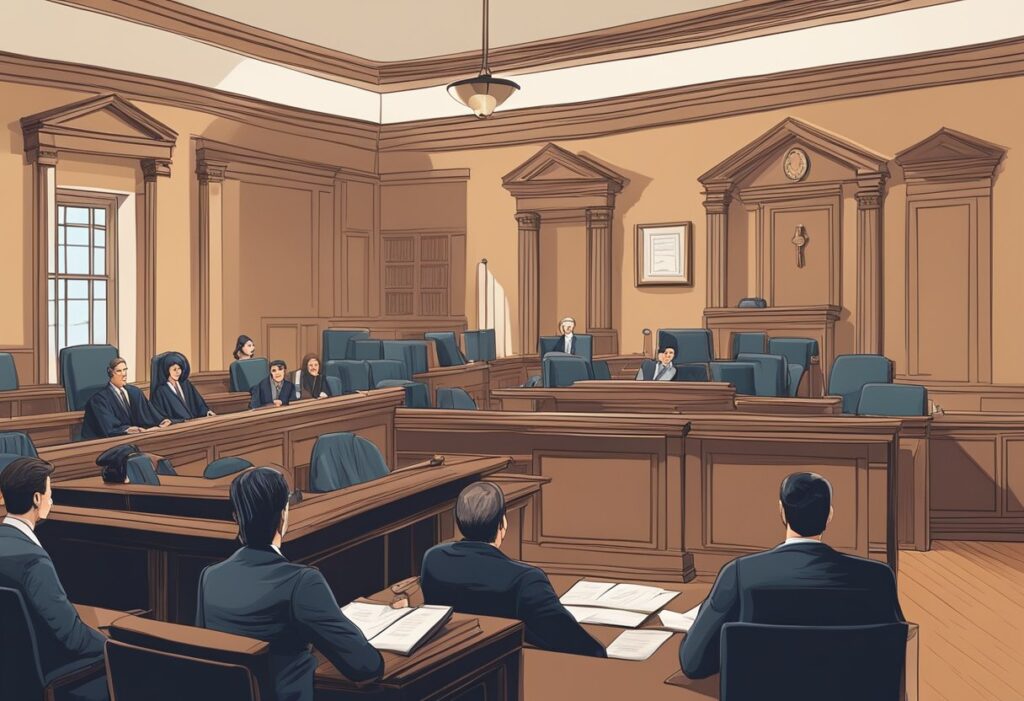Physical Address
304 North Cardinal St.
Dorchester Center, MA 02124
Physical Address
304 North Cardinal St.
Dorchester Center, MA 02124

In the maze of love and law, a contested divorce stands as a complex battleground. Imagine two people, once united in dreams, now divided in destiny. This isn’t just a legal process; it’s an emotional rollercoaster.
So exactly what is a contested divorce? It’s where agreement fades and disputes arise.

Picture this: disagreements over assets, custody, or even the reasons for the split. These aren’t just arguments; they’re battles that shape futures. The stakes? High. The emotions? Higher.
Every decision, every turn in this journey, affects lives deeply. Why do couples end up here, and how does it all unfold? Get ready to dive into the world of contested divorces, where every story is unique and the outcomes are anything but predictable.
Keep reading to unravel the complexities of these heart-wrenching legal struggles.
A contested divorce is a legal procedure that occurs when you and your spouse cannot come to an agreement on critical issues during the dissolution of your marriage.
Divorce is the formal end of marriage, requiring a legal process that varies depending on your jurisdiction. At the heart of divorce are matters such as the division of assets, debt allocation, child custody, and spousal support.
In a contested divorce, you and your spouse disagree on one or more fundamental aspects of your divorce. This dispute may require litigation, where decisions are made by a judge. Contested divorces often take longer and can be more costly due to increased legal fees and court expenses.
Contrastingly, an uncontested divorce is where both you and your spouse agree on all main terms of the divorce. This type of divorce can be resolved more swiftly, often without a lengthy trial, potentially reducing emotional and financial strain.
A contested divorce involves a judicial process where you and your spouse cannot agree on key issues, leading to the requirement of formal legal procedures to resolve these disputes.
To start a contested divorce, you must prepare and file a divorce petition with the court. This legal document outlines the grounds for divorce and your position on matters such as property division, child custody, and support.
You’ll almost certainly want to consult an attorney to ensure your rights are well-represented from the beginning.
Upon serving the divorce petition, your spouse has a set timeframe to file a formal response. The discovery phase follows, where both parties exchange pertinent information and documents. Discovery tools include:
Preparing for trial is a rigorous process involving:
Your attorney’s role is crucial in developing a strategy to present your case effectively. Attorney fees at this stage can increase significantly due to the complexity and length of preparation.
In a trial, both sides present arguments, examine witnesses, and submit evidence. After consideration, the judge issues a judgment, determining the terms of the divorce including asset division, custody arrangements, and any support obligations.
The trial phase is often lengthy and involves considerable attorney and court fees. Once a judge has made a decision, it can be appealed, which may further extend the process and costs.
In a contested divorce, financial considerations play a critical role. You’ll face complex discussions about dividing your shared property, determining any spousal or child support, and assessing the full scope of assets and debts.
In a contested divorce, the division of assets and debts is often a major point of contention. Marital assets include all property and income acquired during the marriage—including real estate, investments, and retirement accounts.
Debts may encompass loans, credit card balances, and mortgages.
Spousal support (or alimony) is designed to provide financial stability to the lower-earning spouse post-divorce. The determination of spousal support accounts for several factors, including the length of the marriage, the standard of living during the marriage, and the earning potential of both parties.
Child support is a separate legal obligation calculated based on income, parenting time, and the needs of the child.
The discovery of hidden assets can be pivotal in a contested divorce. It’s imperative for you to disclose all financial information truthfully. Failure to do so can lead to legal consequences, including a revised division of assets in favor of the other party.
Accurate financial disclosures are necessary to ensure an equitable division of property and fair determination of support obligations.
In a contested divorce, determining child custody and establishing the parameters for parenting time and visitation rights become pivotal aspects of the proceedings.
When you are involved in a contested divorce, the court must intervene to determine child custody arrangements. The court’s primary concern is the well-being of your children, and its goal is to establish a setting that most benefits their physical, emotional, and educational needs.
The types of custody to be considered include:
Factors influencing the court’s decision include the parents’ living situations, caregiving capacities, and the children’s preferences if they are of a certain age or maturity level.
Parenting time, often referenced as visitation, concerns the schedule and conditions under which the non-custodial parent will spend time with the children. Your custody arrangement dictates the frequency and conditions of these visits.
Options include:
Courts strive to enforce visitation plans that foster a relationship between the children and the non-custodial parent, provided this is in the best interest of the children.
In a contested divorce, legal professionals play pivotal roles, each offering distinct services to aid in the resolution of complex marital disputes.
Divorce attorneys are the primary legal representatives for either spouse in a contested divorce. Their responsibilities include:
Neutral third-party professionals, such as mediators, aim to facilitate amicable agreements between disputing parties. Their roles involve:
In contested divorces, expert witnesses may be called upon to provide expert testimony on specific issues. They contribute by:
Your chosen legal representatives, from attorneys to neutral experts, are there to navigate the intricacies of your divorce, ensuring your rights are protected and your voice is heard in the courtroom.

In the context of a contested divorce, you have the option of Alternative Dispute Resolution (ADR) methods, which can provide a path to settle your disputes without going to court. These processes can save time, reduce costs, and offer more privacy than traditional litigation.
Mediation is a voluntary process where you and your spouse work with a neutral third party, the mediator, to negotiate and resolve your differences. The mediator’s role is to facilitate discussion and help you both reach a mutually acceptable agreement.
Collaborative Divorce is a legal process that involves you and your spouse, each with your own specially trained lawyers, working together to resolve your disputes. This process may also bring in other neutral professionals like child specialists or financial advisors as needed.
Arbitration closely resembles a court trial but occurs in a more private setting. An arbitrator, whom you and your spouse choose, hears your arguments and makes a binding decision.
A Settlement Agreement is a comprehensive document outlining the terms of your divorce that you both agree upon. This agreement can be reached through any ADR process or negotiation and is submitted to the court for approval.

After the trial’s conclusion in a contested divorce, you must consider the legal steps that pertain to the enforcement of the decree and the possibility of appeals.
Following the judge’s decision in your contested divorce case, you have the right to appeal the decision if you believe there has been a legal error or substantial injustice. Your notice of appeal must be filed within a specific timeframe, usually dictated by state law.
Be mindful that an appeal is not a re-trial of the case but a review of the legal procedures and rulings to ensure fairness and adherence to the law.
The final order is a critical document that conclusively outlines the terms of your divorce, including asset division, custody arrangements, alimony, and other pertinent details.
Once issued, it signifies the official end of your marriage. This document is legally binding once signed by a judge, ensuring that both parties adhere to the agreed terms.
Enforcement of a divorce decree comes into play if your spouse does not comply with the court-ordered arrangements. If such a situation arises, you may need to return to court to seek enforcement, which can be facilitated through various mechanisms:
Maintain records of any violations of the decree as evidence for enforcement proceedings. Keep in mind that different jurisdictions may have various methods and procedures in place for the enforcement of decrees.

Divorce invariably subjects you to a multitude of emotional and psychological challenges that can precipitate stress and influence your mental health. Navigating through such a process involves coping with a spectrum of adverse feelings and potential conflict, which often extends beyond the legal dissolution of marriage to affecting personal well-being.
Stress is a common response as you grapple with the upheaval of your established personal life. This stress, if prolonged or intense, may have a detrimental effect on your mental health, potentially manifesting in sleep disturbances, anxiety, or depression.
In circumstances where abuse or domestic violence has been present in the marriage, divorce can result in complex psychological outcomes. You might experience relief at the cessation of abuse, but you also could confront lingering trauma. Ensuring that you have access to proper support, such as counseling or support groups, is crucial in such situations.
Mental Health: The emotional toll of divorce may include feelings of sadness, anger, or loss. These intense emotions can persist, thereby impacting your day-to-day life and mental health. Don’t hesitate to seek professional help if you find these feelings overwhelming.
It’s important to acknowledge these effects and consider seeking professional guidance. Support through therapy or joining support groups can provide you with coping mechanisms and a space to process your emotions productively.
Remember, taking care of your emotional and mental health is a critical component of navigating through this challenging phase.

In navigating the complexities of a contested divorce, you may have numerous questions that need clear and concise answers. This section aims to address some of the most common inquiries in a straightforward and factual manner.
Contesting a divorce without an attorney, known as pro se litigation, involves researching your state’s divorce laws and following the specific court procedures. You must file the necessary legal documents, represent your interests in negotiations, and potentially in court.
A contested divorce usually incurs higher legal fees than an uncontested divorce due to longer litigation time, court appearances, and the need for legal or expert consultations. These costs can significantly impact both parties’ financial situations.
A divorce may be finalized without consent if a spouse cannot be located or fails to respond to legal notices. If you believe your divorce was finalized without proper notice, you may be able to contest it by filing for a motion to set aside the judgment within a certain time frame, depending on the state.